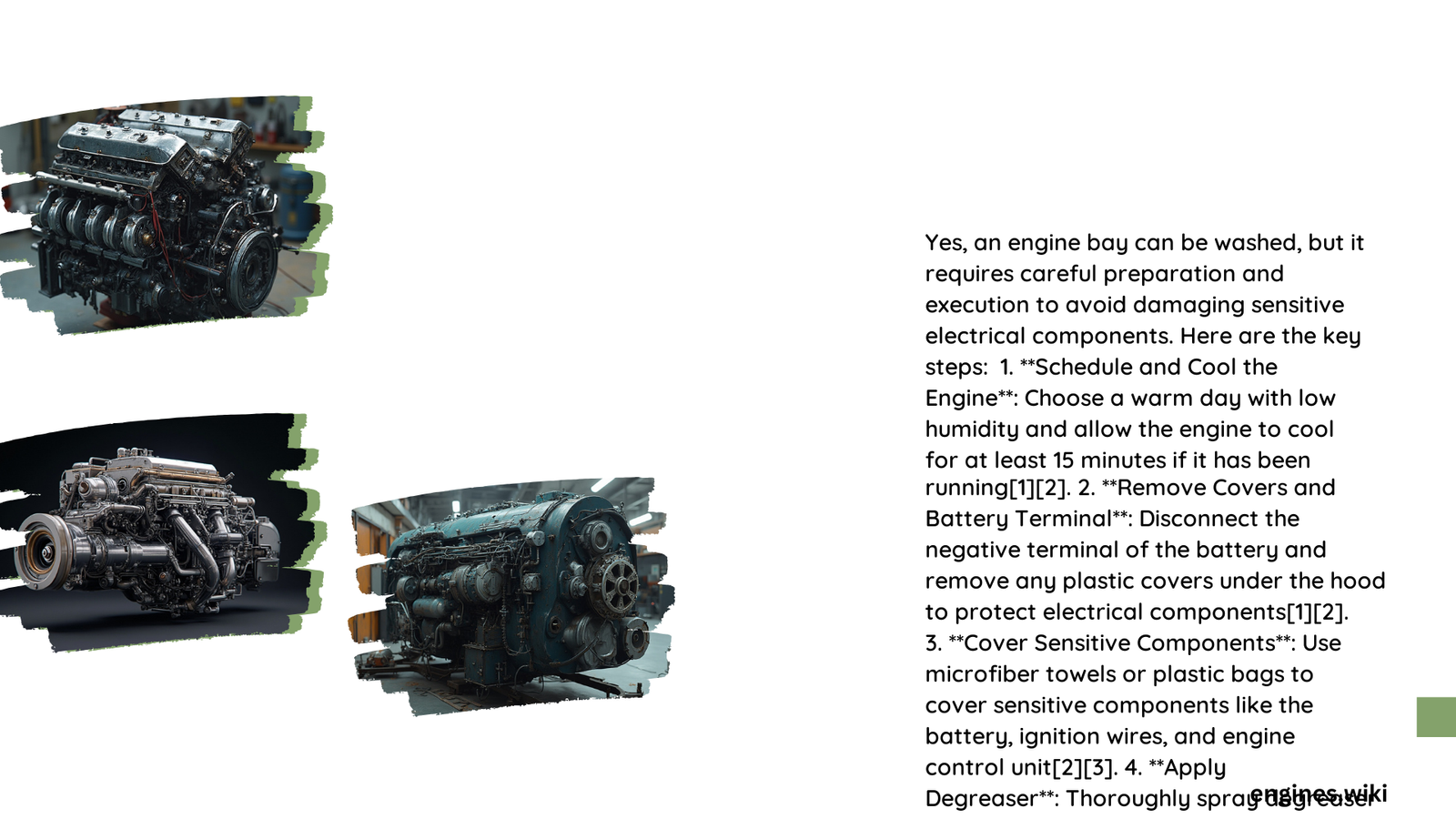Engine bay washing is a crucial aspect of vehicle maintenance that often raises concerns among car owners. This guide provides a detailed overview of safe engine bay cleaning methods, potential risks, and preventative measures to ensure your vehicle’s engine compartment remains clean without causing damage to sensitive components.
Can Engine Bay Be Washed Safely?
Yes, the engine bay can be washed safely if proper precautions and techniques are followed. It’s essential to protect electrical components, use appropriate cleaning agents, and avoid high-pressure water to prevent damage to sensitive parts.
What Are the Safe Methods for Engine Bay Washing?

Safe engine bay washing involves using the right tools, cleaning agents, and techniques:
Tools and Cleaning Agents:
- Degreaser (non-foaming or diluted household degreaser)
- Soft-bristle brushes
- Microfiber cloths and rags
- Plastic bags and zip ties
- Shop vac
Step-by-Step Process:
- Prepare the area:
- Choose a warm, low-humidity day
- Allow the engine to cool for 15-30 minutes
- Cover electrical components:
- Disconnect the battery’s negative terminal
- Use plastic bags and zip ties to protect sensitive parts
- Remove loose debris:
- Use a soft-bristle brush or shop vac
- Apply degreaser:
- Spray liberally and let sit for 15-30 seconds
- Scrub and rinse:
- Use soft-bristle brushes
- Rinse with low-pressure water
- Dry the engine bay:
- Use microfiber cloths or compressed air
What Techniques Minimize Risks During Engine Bay Washing?
To minimize risks to electrical systems and sensitive parts:
Precautions:
- Protect all electrical components
- Avoid high-pressure water
- Wear proper protective gear
Process:
- Take a before picture for reference
- Remove covers and disconnect the battery
- Cover sensitive components
- Rinse, clean, and dry thoroughly
What Are the Potential Risks of Engine Bay Washing?
Engine bay washing carries some risks if not done properly:
Risks:
- Damage to electrical components
- Damage to gaskets and seals
- Thermal shock
Preventative Measures:
- Ensure the engine is cool before cleaning
- Use low-pressure water
- Thoroughly cover all electrical components
What Precautions Should Be Taken When Power Washing the Engine Bay?
When using a power washer for engine bay cleaning:
Pressure Settings:
- Use low-pressure settings
- A garden hose with a low-pressure nozzle is often sufficient
Distance from Components:
- Keep the nozzle at least one foot away from delicate parts
Protective Measures:
- Cover all electrical components
- Disconnect the battery
- Use compressed air for drying
How Often Should the Engine Bay Be Cleaned?
The frequency of engine bay cleaning depends on several factors:
| Driving Conditions | Recommended Cleaning Frequency |
|---|---|
| Normal | Every 3-6 months |
| Dusty/Dirty | Every 1-3 months |
| Off-road | After each off-road trip |
Regular cleaning helps maintain the engine’s efficiency and makes it easier to spot potential issues.
What Are the Benefits of a Clean Engine Bay?
Keeping your engine bay clean offers several advantages:
- Easier maintenance and repairs
- Improved heat dissipation
- Early detection of leaks and worn components
- Enhanced resale value
- Reduced risk of electrical issues
Can DIY Engine Bay Cleaning Be as Effective as Professional Services?
DIY engine bay cleaning can be effective if done correctly:
Pros of DIY Cleaning:
- Cost-effective
- Allows for regular maintenance
- Increases familiarity with your vehicle
Cons of DIY Cleaning:
- Risk of damage if not done properly
- Time-consuming
- May lack specialized tools
Professional services offer expertise and specialized equipment but come at a higher cost.
What Are the Best Products for Engine Bay Cleaning?
Choosing the right products is crucial for effective and safe engine bay cleaning:
- Degreasers:
- Simple Green
- Zep Industrial Purple Cleaner/Degreaser
-
Chemical Guys Signature Series Orange Degreaser
-
Brushes:
- Detail Factory Boar’s Hair Brush Set
-
Chemical Guys Acc_S90 Short Handle Brush
-
Microfiber Cloths:
- Meguiar’s X2020 Supreme Shine Microfiber Towels
- Chemical Guys MIC_506_12 Professional Grade Microfiber Towels
Always choose products specifically designed for automotive use to ensure safety and effectiveness.
References:
- https://www.zpost.com/forums/showthread.php?t=1515481
- https://www.shinearmor.com/blogs/news/how-to-clean-engine-bay
- https://www.caranddriver.com/features/a27104161/how-to-clean-engine/
- https://www.chemicalguys.com/blogs/exterior-how-tos/how-to-clean-your-engine-bay
